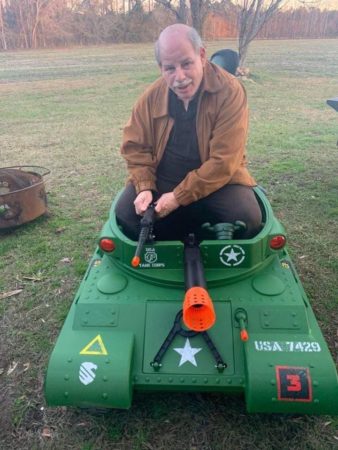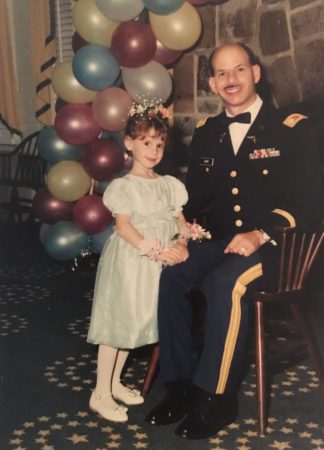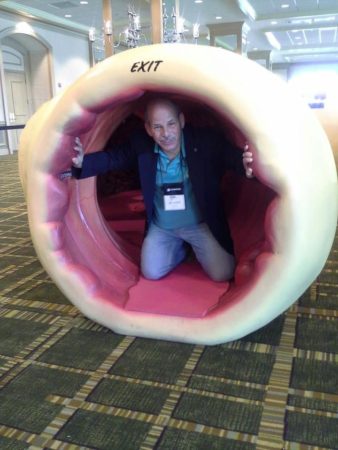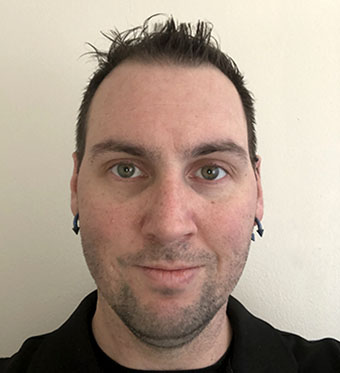Finding Humor in life with an ostomy and IBD
My name is LTC(R) Justin F. Blum and I had my initial ostomy surgery 29 years ago and my rectum removed six years later. These surgeries were done because of an ulcerative colitis diagnosis that lead to colon cancer.
During the 1980s, I had many colonoscopies and a litany of medications, the Army assigned me to duty stations in Kentucky, South Carolina, Birmingham AL, and Fort Monroe VA. I started with 20mg of Prednisone per day and that went up to 240mg in the fall of 1992. During that following winter, I made an appointment with an Army gastroenterologist at Eisenhower Army Hospital, Fort Gordon GA. After the exam, he told me I needed to have ostomy surgery. I knew what an ostomy was, I raised

Still a tanker at heart!
my voice and said, “The only way I will have ostomy surgery is if my back is to the wall and I have one foot already in the grave”. Little did I know in one year I would be having that surgery. I was bleeding profusely while taking 240mg of Prednisone per day. My last colonoscopy showed that I had a large black spot on the transverse part of my colon.
My doctor immediately scheduled me for ostomy surgery at the end of February 1993. I was in the hospital for two weeks and proceeded to convalesce at home for 30 days. Three weeks into the leave, my wife and I tried having sex for the first time as an ostomate. My bag ended up going where no bag has ever gone before and probably had a better time than we did. After some maneuvering, life did get better! I reported back to duty in Birmingham AL after convalescent leave was over. I was eventually given a J Pouch which I had for four years.
My years with IBD and now an ostomy showed me that it takes a village to obtain a good quality of life.
The next few years living with my J-pouch were horrible. Despite taking 15 hospital strength Imodium per day, I was still defecating 20 times per day. I continuously was sore on my bottom. I would develop leaks and I ended up having to wear pantyliners in my underwear. When I retired from active duty in August 1996, I immediately started my second career as an Army JROTC Instructor in Bennettsville SC. I continued to go to the bathroom quite frequently and in the spring of the following year my daughter, who was six at the time, wanted me to play horsey with her and take her around the block. I bent down half in tears and told her that “daddy can’t play horsey because he is too sore on his bottom”. I immediately went to talk to my wife and we both agreed it was time to get back to having an ostomy bag. That summer at the Columbia SC Veterans Administration hospital, I had my third surgery to restore my ostomy due to my poor quality of life with the J Pouch. On the positive side, since I’ve had an external pouch, the veteran’s administration awarded me 100% total and permanent disability. I spent the next 23 years as an Army JROTC Instructor.
pantyliners in my underwear. When I retired from active duty in August 1996, I immediately started my second career as an Army JROTC Instructor in Bennettsville SC. I continued to go to the bathroom quite frequently and in the spring of the following year my daughter, who was six at the time, wanted me to play horsey with her and take her around the block. I bent down half in tears and told her that “daddy can’t play horsey because he is too sore on his bottom”. I immediately went to talk to my wife and we both agreed it was time to get back to having an ostomy bag. That summer at the Columbia SC Veterans Administration hospital, I had my third surgery to restore my ostomy due to my poor quality of life with the J Pouch. On the positive side, since I’ve had an external pouch, the veteran’s administration awarded me 100% total and permanent disability. I spent the next 23 years as an Army JROTC Instructor.
By the Fall of 1997, I was ready for my first formal engagement with my ostomy. The NAACP was conducting its annual scholarship banquet and I was one of the evening’s speakers. I made a very big mistake on the Saturday morning of the event by eating two packets of oatmeal for breakfast. I then went to a local bowling alley with my 6-year-old daughter for a birthday party. At the party, I ate too much popcorn! That evening my wife and children attended the dinner and I was dressed in my brand-new army dress mess uniform. I was sitting on the stage at the head table when it was my time to give remarks. Once I was finished with my remarks I looked down and I thought I had spilled some water on my lap. After a closer look, I realized that that was not water but wet feces seeping through my lap. I immediately got up and my wife and I proceeded to the nearest restroom. In the men’s room, my wife was straddling me with her body trying to clean off the feces from my pouch with one hand and trying to put on a new ostomy bag with the other. During this time three individuals came into the restroom and became startled because they thought we were having sex on the floor!
From 1997 to 2002 I would experience a lot of burning, stinging, and itching around my stoma. Unfortunately, I did not have access to an ostomy nurse at any of the two hospitals where I lived in Florence SC. To my good fortune, a new assistant WOC nurse was assigned to Carolinas Hospital. I called the nurse the next day and told her about the problems I was experiencing on my skin. She immediately asked if I could come in the next day for her to examine my broken skin. That next day she examined my skin and applied Nystatin Powder to the inflamed areas. Within two days the burning, stinging, soreness, and red skin started to heal very quickly.
Despite the ostomy pouch I worked very hard my first few years and to my happiness in 2003, was named the Army Junior ROTC instructor of the year for the entire worldwide JROTC system that consists of over 5000 instructors. In August of 2010 I received a letter from Cindy Norris, Carolina’s Hospital WOC nurse who enclosed an application for the ConvaTec sponsored Great Comebacks program. The Great Comebacks program identified ostomates that also accomplished acts in their lives of giving back to others. I mailed the application back for processing. The application highlighted my time with IBD and then in 1993 acquiring my ostomy while the whole time serving my country as an officer in the United States Army. In addition, in November 2009 I was promoted to the rank of full Colonel in the South Carolina State Guard. I received a phone call from former NFL Placekicker Rolf Benirschke with the great comebacks program. He told me I would be the recipient of the Tony Snow Award for Public Service. The Tony Snow Award was annually given to an individual who has an ostomy and performed years of public service to our nation.
In 2010 and 2011 I was honored to be recognized with several awards. I was named the 2010 volunteer of the year for South Carolina, the Tony Snow award winner, and in the summer of 2011, I was named for the second time the Army JROTC instructor of the Year. South Carolina Representative the Honorable Jim Clyburn recognized me on the floor of the House of Representatives in the summer of 2011 for these mentioned achievements while having an ostomy.
Eight years later I retired after 23 years as a JROTC instructor for a total of 44 years in uniform. My first act as a retiree was to apply to become a member of the United Ostomy Associations of America’s Board of Directors. To my good fortune, I became a board member and will have served a total of four years upon the conclusion of this tour of duty.

Justin at UOAA’s National Conference in Jacksonville , FL in August 2013. He now serves as a member of UOAA’s Board of Directors.
Over the four years, I was diagnosed and experienced neuropathy in conjunction with my ostomy. I was first put on a regimen of three 800mg tablets of Gabapentin per day which lasted six months. Not feeling any relief from the pain my doctor said we should try acupuncture. Apparently, the ears are where the acupuncture needles went because it was a central place for the pain sensors around my stoma. I was on acupuncture for about 3 months and unfortunately, I did not see any relief. My doctor prescribed Lyrica, which is a derivative of Gabapentin. I started with one tablet per day now I am up to three tablets after two months. My pain levels have gone down considerably and fortunately I have been able to start exercising again in moderation.
My years with IBD and now an ostomy showed me that it takes a village to obtain a good quality of life. My wife Leah, who I refer to as my “Chief of Staff” is the most important person in my village. She stood by my side during four surgeries and all the years of total discomfort. In addition, if not for my caring and loving wife, I never would have gotten through the transition from non-ostomate to being an ostomate. She is my go-to person for any of my problems and she is both sympathetic and empathetic to those problems. She also stood by my side during countless tours of duty with the Army bringing her continually farther away from her home in New Jersey. Ten years prior to my initial surgery, in 1993, my father died at the age of 61 from colon cancer that spread to his liver. My ostomy surgery gave me a second chance to live because I was a prime example that ostomies save lives! If I did not have my proctocolectomy, my young wife would have become a widow with three children all under the ages of seven.
I am also most fortunate to have three WOC nurses in my life: Joy Hooper, Donna Sellers, and Joanna Burgess-Stocks. I can contact any of those three nurses at any time of the day or night, especially Joanna, if I am having problems with my ostomy/neuropathy. A healthy support system is needed for anyone inflicted with these lifetime conditions. I have learned to always look at the positive side of life throughout all those years I had IBD and now my ostomy. Today I counsel individual ostomates who are having problems adjusting to their ostomy and speak to UOAA Affiliated Support Groups around the country via Zoom and share my story and listen to theirs. Remember, you’re not alone!

 I was told if I didn’t have the surgery when I did, my Crohn’s disease would have killed me. Surgery made a drastic change in my life for the better. Now I will be around for my wife and kids.
I was told if I didn’t have the surgery when I did, my Crohn’s disease would have killed me. Surgery made a drastic change in my life for the better. Now I will be around for my wife and kids.

